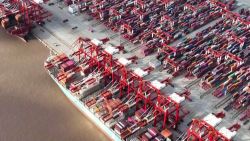The Chinese government has ordered the country’s coal mines to “produce as much coal as possible” as it tries to increase production as winter approaches, and ease an ongoing energy crunch.
The announcement from China’s National Development and Reform Commission comes after weeks of power shortages across many provinces, forcing the government to ration electricity during peak hours and some factories to suspend production. The problem has weighed on economic growth as industrial output drops.
Beijing pushed coal mines to curtail production earlier this year as the country pursued ambitious targets to cut carbon emissions. But demand has surged for projects that require fossil fuels, and there just hasn’t been enough power to go around.
To combat the problem, China began ordering coal mines to ramp up production, with authorities in Inner Mongolia, the country’s second largest coal-producing province, ordering dozens of mines to boost output earlier this month.
Now, the NDRC is demanding that mines nationwide up production by as much as they can heading into the final quarter of 2021. Shutting down coal mines is prohibited.
Coal inventory has been steadily increasing since the end of September, the commission said. Northeastern provinces, where acute shortage resulted in power rationing, have now stockpiled enough coal to support 24 days of electricity usage — an 11-day increase compared to the beginning of October.
The government has taken other steps to ease the crunch. It increased the price of electricity by 20% among provinces with higher demand, to close the price gap between coal and power. Power plants in China had been unwilling to boost production because of the high cost of coal. And since Beijing controls the cost of power, producers couldn’t simply raise their prices without the go-ahead from the government.
Authorities are also leaning on other forms of energy to alleviate problems. The NDRC asked companies that generate power using nuclear energy, as well as solar, hydro and wind turbines to avert outages in residential areas.
The power crunch in the world’s second biggest economy continues to pose threats on global supply chains. Suppliers to major US companies such as Apple (AAPL) have scaled back their production levels to cooperate with electricity restrictions imposed by local governments.
Energy problems aren’t just prevalent in China. Indian authorities have have warned that key regions could face a “power crisis” as the cost of electricity rises. The cost of natural gas has also skyrocketed in Europe.
– Laura He contributed to this story.
























